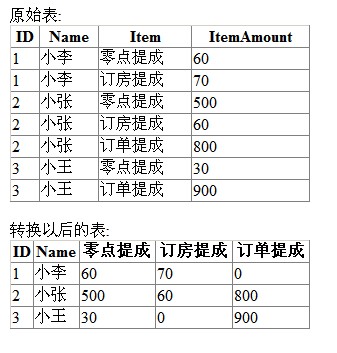<%@ Page Language="C#" AutoEventWireup="true" CodeFile="LinqDemo2.aspx.cs" Inherits="LinqDemo2" %>
<!DOCTYPE html PUBLIC "-//W3C//DTD XHTML 1.0 Transitional//EN" "http://www.w3.org/TR/xhtml1/DTD/xhtml1-transitional.dtd">
<html xmlns="http://www.w3.org/1999/xhtml">
<head runat="server">
<title>LinQ实现DataTable不定行转列</title>
</head>
<body>
<form id="form1" runat="server">
<div>
原始表:<br />
<asp:GridView ID="GridView1" runat="server" Width="300px">
</asp:GridView>
<br />
转换以后的表:<br />
<asp:GridView ID="GridView2" runat="server" Width="300px">
</asp:GridView>
</div>
</form>
</body>
</html> - 1
- 2
- 3
- 4
- 5
- 6
- 7
- 8
- 9
- 10
- 11
- 12
- 13
- 14
- 15
- 16
- 17
- 18
- 19
- 20
- 21
- 22
using System;
using System.Collections.Generic;
using System.Linq;
using System.Web;
using System.Data;
using System.Web.UI;
using System.Web.UI.WebControls;
public partial class LinqDemo2 : System.Web.UI.Page
{
protected void Page_Load(object sender, EventArgs e)
{
#region 添加一个表
DataTable _dt = new DataTable();
_dt.Columns.Add(new DataColumn("ID", typeof(int)) { DefaultValue = 0 }); //员工 id
_dt.Columns.Add(new DataColumn("Name", typeof(string)) { DefaultValue = "1" }); //员工名字
_dt.Columns.Add(new DataColumn("Item", typeof(string)) { DefaultValue = "1" });//员工提成规则
_dt.Columns.Add(new DataColumn("ItemAmount", typeof(double)) { DefaultValue = 0 }); //提成钱数
_dt.Rows.Add(1, "小李", "零点提成", 60);
_dt.Rows.Add(1, "小李", "订房提成", 70);
_dt.Rows.Add(2, "小张", "零点提成", 500);
_dt.Rows.Add(2, "小张", "订房提成", 60);
_dt.Rows.Add(2, "小张", "订单提成", 800);
_dt.Rows.Add(3, "小王", "零点提成", 30);
_dt.Rows.Add(3, "小王", "订单提成", 900);
#endregion
//输出原始表
GridView1.DataSource = _dt;
GridView1.DataBind();
//输出行转列以后的表
GridView2.DataSource = ConvertToTable(_dt);
GridView2.DataBind();
}
#region 转换表
static DataTable ConvertToTable(DataTable source)
{
DataTable dt = new DataTable();
//前两列是固定的加上
dt.Columns.Add("ID");
dt.Columns.Add("Name");
//以Item 字段为筛选条件 列转为行 下面有图
var columns = (from x in source.Rows.Cast<DataRow>() select x[2].ToString()).Distinct();
//把 Item 字段 做为新字段添加进去
foreach (var item in columns) dt.Columns.Add(item).DefaultValue = 0;
// x[1] 是字段 Name 按 Name分组 g 是分组后的信息 g.Key 就是名字 如果不懂就去查一个linq group子句进行分组
var data = from x in source.Rows.Cast<DataRow>()
group x by x[1] into g
select new { Key = g.Key.ToString(), Items = g };
data.ToList().ForEach(x =>
{
//这里用的是一个string 数组 也可以用DataRow根据个人需要用
string[] array = new string[dt.Columns.Count];
//array[1]就是存名字的
array[1] = x.Key;
//从第二列开始遍历
for (int i = 2; i < dt.Columns.Count; i++)
{
// array[0] 就是 ID
if (array[0] == null)
array[0] = x.Items.ToList<DataRow>()[0]["ID"].ToString();
//array[0] = (from y in x.Items
// where y[2].ToString() == dt.Columns[i].ToString()
// select y[0].ToString()).SingleOrDefault();
//array[i]就是 各种提成
array[i] = (from y in x.Items
where y[2].ToString() == dt.Columns[i].ToString()// y[2] 各种提成名字等于table中列的名字
select y[3].ToString() // y[3] 就是我们要找的 ItemAmount 各种提成 的钱数
).SingleOrDefault();
}
dt.Rows.Add(array); //添加到table中
});
return dt;
}
#endregion
} - 1
- 2
- 3
- 4
- 5
- 6
- 7
- 8
- 9
- 10
- 11
- 12
- 13
- 14
- 15
- 16
- 17
- 18
- 19
- 20
- 21
- 22
- 23
- 24
- 25
- 26
- 27
- 28
- 29
- 30
- 31
- 32
- 33
- 34
- 35
- 36
- 37
- 38
- 39
- 40
- 41
- 42
- 43
- 44
- 45
- 46
- 47
- 48
- 49
- 50
- 51
- 52
- 53
- 54
- 55
- 56
- 57
- 58
- 59
- 60
- 61
- 62
- 63
- 64
- 65
- 66
- 67
- 68
- 69
- 70
- 71
- 72
- 73
- 74
- 75
- 76
- 77
- 78
- 79
- 80
